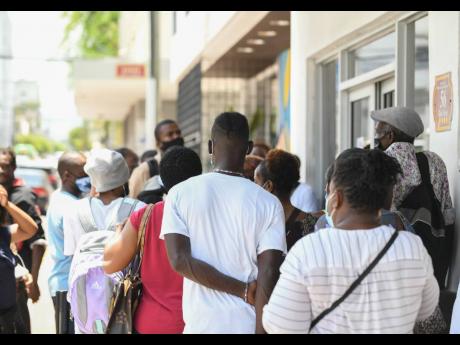Dacia Leslie | An efficient police record process critical to Vision 2030
As Jamaica aspires to achieve its Vision 2030 goals within the next seven years, a critical hurdle stands in the way. The ramifications of inefficiencies linked to obtaining a police record reverberate across multiple fronts, casting a shadow on the vision.
A police record, which is also known as a criminal record or police clearance certificate, provides a documented account of one’s criminal history or lack thereof. It is, therefore, essential for several reasons, including background checks when applying for specific jobs. It might also be needed for immigration and visa application purposes or when seeking to obtain certain professional licences.
A police record can, therefore, establish credibility and trustworthiness, particularly in situations where personal integrity and accountability are paramount. As such, some employers, authorities, and organisations will request a police record, which can provide valuable insights into an individual’s background and help determine whether that person is suitable for specific roles or responsibilities.
According to the Ministry of National Security’s website, there are five “easy” steps to follow when applying for a police record:
1. Pay the fee at any of the Inland Revenue Department Offices (Tax Office)
2. Visit the JCF’s website to complete the Application Form
3. Select your Appointment date
4. Attend your Appointment at the Criminal Records Office
5. Collect Police Record/Certificate
Instructions are also available on the Jamaica Constabulary Force’s website, which further details the process for overseas applicants. Additionally, diG Jamaica has a step-by-step guide: http://digjamaica.com/m/blog/how-to-get-a-police-record-in-jamaica-a-ste... and the Jamaica Citizens Guide has created a YouTube video which some persons may find helpful.
REFERENCE POINT
The steps outlined by these sources should only serve as a reference point because, in practice, the application process might not be as straightforward, especially for elderly persons, persons with disabilities, lower-income earners and persons living in rural or underserved areas. This is not surprising because the process of obtaining a police record in Jamaica has long been mired in challenges, from lengthy delays to convoluted administrative procedures. However, the largely manual and ad hoc collection system that sometimes characterises Step 5 erodes the potential to create and sustain an environment in which people are eager to establish their lives and enterprises.
Not only do these inefficiencies result in lost productivity on the part of businesses, but they also negatively affect the everyday woman or man on the street who may have to forgo earning an income on a particular day to wait in a crowd with no idea of whose name will be called next, or guarantee that the record they have applied for will be ready on the given collection date. These administrative uncertainties help to erode investor confidence and reflect poorly on the overall ease of doing business in Jamaica. Notwithstanding these bottlenecks, Jamaica has been working to modernise its public service through various new public management-inspired initiatives.
The process of obtaining a police record has particularly benefited from several reforms, including the upgrading of the Jamaica Constabulary Force’s Automated Palm and Fingerprint Identification System, which helped to reduce the long line of persons waiting for their appointments. The implementation of online applications no longer made it necessary to book appointments via telephone. It also expanded access, especially for persons with mobility constraints and minimised paper usage, thereby helping to save time while contributing to environmental sustainability. The ability to download and save digital copies of the application form and receipt also offers convenience.
TECHNOLOGICAL SOLUTIONS
The government is also exploring technological solutions to further digitise the service through the security strengthening project. This will help ensure quicker turnarounds and reduce the burden on applicants and law enforcement agencies. Accelerating digitisation aligns with the nation’s commitment to harness technology for the greater good of public safety. When fully realised, it will help to expedite the provision of police records, allowing officers to make well-informed decisions in real time. With quicker access to records, the police can respond more promptly to emerging threats and focus their efforts on primary crime prevention. This move certainly holds much promise for a more responsive and agile law enforcement framework that paves the way for a safer, more inviting, environment that fulfils the aspirations of citizens, families, workers, and businesses alike. But we must find better ways of putting people at the centre of a service that is so crucial and critical to national development. This might include:
• Simplifying the fee payment process by enabling secure online payment options, thereby eliminating the need for applicants to physically visit an Inland Revenue Department Office (Tax Office);
• Incorporating real-time tracking within the online application system, thus allowing applicants to monitor the progress of their applications. This will also reduce time lost visiting collection sites and waiting in large crowds when records might not be ready for pick-up on the given collection date;
• Offering alternative application methods or assistance as needed for elderly persons, persons with disabilities or other persons who may require specialised assistance;
• Providing feedback mechanisms, including reports on how feedback received has been used to improve service delivery;
• Offering courier delivery of the physical police record document; and
• Ongoing capacity development to ensure that the necessary safeguards are in place to maintain data security and privacy.
Dacia Leslie, PhD is senior fellow at the Sir Arthur Lewis Institute of Social & Economic Studies, The University of the West Indies, Mona. Send feedback to columns@gleanerjm.com


